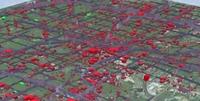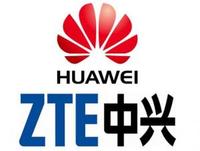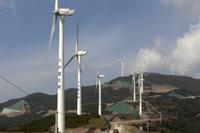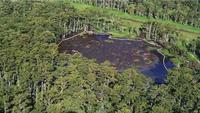-
Study maps greenhouse gas emissions down to building, street level for U.S. cities

Researchers have developed a new software system capable of estimating greenhouse gas emissions across entire urban landscapes, all the way down to roads and individual buildings. Until now, scientists quantified carbon dioxide (CO2) emissions at a much broader level
-
-
Congressional panel says two Chinese telecom companies pose “national security threat” to U.S.

A report by the House Intelligence Committee recommended that the U.S. government be barred from doing business with two Chinese telecommunications firms – Huawei and ZTE – and that American companies should avoid buying their equipment; a committee report said the two companies pose a threat to U.S. national security; installing these companies’ technology in U.S. communication network will not only allow these companies, acting on behalf of the Chinese military and intelligence, to steal sensitive national security information and trade secrets of private U.S. companies – it will also allow China to attack and paralyze large portions of U.S. critical infrastructure
-
-
Infrastructure security market to reach a value of $32.55 billion in 2012
The infrastructure security market has rapidly developed over the past decade, with the formation of a host of governmental and international organizations dedicated to homeland security and critical infrastructure protection; a new report says growth trends in the infrastructure protection market will continue
-
-
CO2 emissions as a result of economic growth, decline not symmetrical
Estimating the trajectory of CO2 emissions, an important part of planning for climate change mitigation and adaptation, depends in part on understanding how these emissions are influenced by the economy; new study finds that in years when GDP per capita shrinks, CO2 emissions per capita do not decline in equal proportion to the amount by which they increase with economic growth
-
-
Camera for long-range gas leak detection

New infrared gas imaging camera equipped with a 75 mm lens; it iscertified for use in Class I Div 2 hazardous locations, enabling remote detection and visualization of gas leaks from a great distance
-
-
The administration set to issue a cybersecurity executive order

President Obama issued a proclamation the other day making October National Cyber Security Awareness month. The administration’s efforts to push a cybersecurity bill through Congress, however, have so far failed, so the administration is opting for a solution other administrations have adopted in the face of a recalcitrant Congress: executive order
-
-
China’s infrastructure is failing owing to sub-standard materials, corruption, and lax regulation
Shoddy infrastructure in China has put people in danger time and time again; many of the infrastructure issues in China stem from the government’s focus on quantity over quality, as well as making sure that as many people are employed as possible for a project, rather than using the latest construction technology; sub-standard materials, corruption, and lax regulation only exacerbate the problem
-
-
City of Ottawa sits atop soft soil, a geologic features which amplifies seismic waves

Roughly 20 percent of the Ottawa area is built on bedrock, while the remaining area contains unconsolidated surface deposits; this is not good news for city planners – and dwellers – because soft soil amplifies seismic waves, resulting in stronger ground motion than for sites built over bedrock
-
-
Assessment reports mineralization of 2.173 million tons rare Earths elements in Idaho, Montana
U.S. Rare Earths, Inc. announced the other day the final results of an independent analysis of historic exploration work done on its Idaho and Montana properties
-
-
Obama blocks purchase of U.S. wind farms by Chinese company

Last Friday President Barack Obama blocked a Chinese company from owning four wind farm projects in northern Oregon; Obama cited security risks for the action, making it the first time in twenty-two years that a U.S. president has blocked a foreign business deal
-
-
New study tracks long-term sea-level rise
Greenhouse gas emissions up to now have triggered an irreversible warming of the Earth which will cause sea-levels to rise for thousands of years to come, new research has shown; mankind has already committed itself to a sea-level rise of 1.1 meters by the year 3000 as a result of greenhouse gas emissions up to now; this irreversible damage could be worse, depending on the route we take to mitigating emissions
-
-
Former DHS official says U.S. should go on cybersecurity offensive
Stewart Baker, the first assistant secretary for policy at DHS under President George W. Bush, has a straightforward theory when it comes to cyber security in the United States: “To prevail in the cybersecurity war, defense is not enough”; not all cuber experts agree with him
-
-
Experts warn of growing cyber security risks to U.S., criticize Congress’s inaction
U.S.and Russian cyber experts are trying to scare officials into improving cybersecurity protection in the United Statesand around the world; cyber attacks against critical infrastructure escalate in scope and severity; soon, Kaspersky Lab’s Eugene Kaspersky said: “If previous viruses were like bicycles,then the Stuxnet worm that damaged uranium enrichment centrifuges at the Natanz plant in Iran two years ago would be a plane and the latest programs, dubbed Flame and Gauss,would be space shuttles”
-
-
Experts trying to determine cause of a giant Louisiana sinkhole

The earth near Bayou Corne, Louisiana opened on 2 August: a 300-foot-wide sinkhole, with depth varying between 50 and 300 feet, suddenly opened up in an area, and the authorities have been trying to determine whether the sinkhole was caused by the collapse of an abandoned brine mining cavern along the margin of the Napoleonville Salt Dome or by something else
-
-
Pentagon says privately owned computer networks vulnerable to attack

Deputy U.S. Defense Secretary Ashton Carter told hundreds of industry executives and military officials at a conference that he is concerned with the potential of a cyber attack on privately owned U.S. computer networks; “I hope this isn’t one of those situations where we won’t do what we need to do until we get slammed,” Carter said
-
- All
- Regional
- Water
- Biometrics
- Borders/Immig
- Business
- Cybersecurity
- Detection
- Disasters
- Government
- Infrastructure
- International
- Public health
- Public Safety
- Communication interoperabillity
- Emergency services
- Emergency medical services
- Fire
- First response
- IEDs
- Law Enforcement
- Law Enforcement Technology
- Military technology
- Nonlethal weapons
- Nuclear weapons
- Personal protection equipment
- Police
- Notification /alert systems
- Situational awareness
- Weapons systems
- Sci-Tech
- Sector Reports
- Surveillance
- Transportation
Advertising & Marketing: advertise@newswirepubs.com
Editorial: editor@newswirepubs.com
General: info@newswirepubs.com
2010-2011 © News Wire Publications, LLC News Wire Publications, LLC
220 Old Country Road | Suite 200 | Mineola | New York | 11501
Permissions and Policies
Editorial: editor@newswirepubs.com
General: info@newswirepubs.com
2010-2011 © News Wire Publications, LLC News Wire Publications, LLC
220 Old Country Road | Suite 200 | Mineola | New York | 11501
Permissions and Policies
